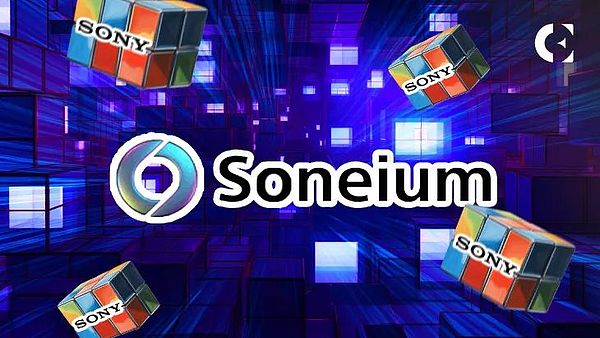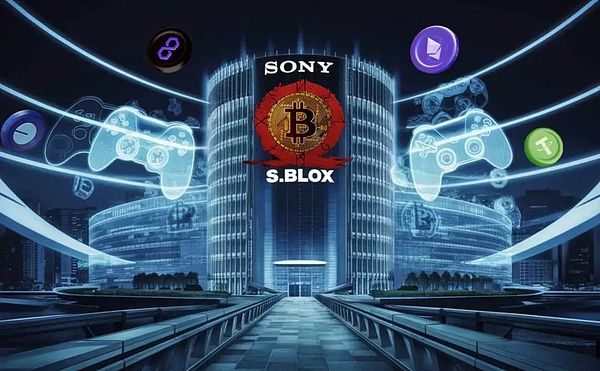For a long time, many traditional institutional giants have tried to enter the encryption and Web3 market by cautiously purchasing some Bitcoin spot ETFs first, and then publicly announced that they have laid out the encryption and web3 world. However, Sony did not follow this convention and directly chose Bitcoin. Instead, it took a different path and established its own subsidiary to quietly lay out the Web3 infrastructure and trading platform.
If it is easy to understand that configuring ETFs or directly holding BTC is more speculative, after all, there are more speculative elements, but Sony chose to directly participate in the construction of Web3, which is a precedent. Perhaps the electronics giant Sony has already made serious plans for the future of Web3 and has figured out what it wants...
Sony District Fast Chain Soneium
Recently, the Ethereum Layer2 Soneium blockchain developed by Sony Block Solutions Labs under the Sony Group announced the launch of the test network Minato and the developer incubation program Soneium Spark. Like the Base blockchain, Soneium is built using the OP Stack of the Optimism blockchain ecosystem. Sony positions it as a general blockchain platform designed to evoke emotional resonance, empower creativity, meet diverse needs and drive mainstream adoption.

Sony Block Solutions Labs was founded by Sony Group and Startale Labs. Startale Labs, a Web3 company headquartered in Singapore, has received seed round investment from Sony Network, Samsung Next Ventures and UVM Signum Blockchain Fund. In short, unlike many traditional institutions that only buy ETFs and hold shares to enter the Web3 market, the Soneium project (originally named Sony Chain) is the "son" of the Sony Group who personally entered the Web3 market.
On September 1, Startale Labs CEO revealed at X that Soneium is working to build a universal creation platform that allows everyone to become a creator, regardless of geographical or professional restrictions. Currently, Soneium is developing multiple creative IP use cases, aiming to drive projects into the mainstream market through community power. The platform will provide individuals and communities with opportunities for collaborative creation, with emotional resonance at its core, to inspire user creativity.
The official blog post of the Soneium blockchain quoted Jun Watanabe, chairman of Sony Block Solutions Labs, as saying: "We believe that the development of a comprehensive Web3 solution based on blockchain technology is very important for the Sony Group, which has developed a variety of businesses as part of its goal of 'making the world full of emotions through the power of creativity and technology'. We will work hard to create diverse businesses and new use cases, aiming to provide as many users as possible with customer value that can only be enjoyed through Web3 technology, making people's lives more colorful."
Director Sota Watanabe said: "We believe that Sony Group's partnership with Startale to launch Ethereum Layer2 is a critical moment for the entire industry. Due to the lack of general user touchpoints and their feedback, the Web3 industry has been making products for itself. Sony Group has strong distribution channels in multiple industries and existing users in our daily lives. Through Soneium, we will make things that people want and become mainstream outside of web3. "
From the information disclosed by Soneium officials, Sony has identified that many infrastructures and applications in the current Web3 industry are only for "insiders", which is also one of the main dilemmas of the Web3 industry and the crypto market at present.Sony's goal is to create a real application for Web3 infrastructure and tools to solve practical problems, rather than just "speculating on tokens", combining its own business and resource advantages to bring the benefits of Web3 to a wider range of Web2 mainstream Internet users.
It is reported that most of the features of the Soneium blockchain are the same as other Ethereum Layer2, EVM compatible, high-speed, and users do not need to pay Gas fees.This can create APIs and tools for developers to create intuitive, user-friendly applications familiar to mainstream users while integrating into the Ethereum ecosystem, thereby lowering the entry threshold of blockchain technology and creating a Web3 The ecosystem that technology brings to everyday users.
It stands to reason that Web3 infrastructure is usually launched by crypto-native startup teams because crypto-native teams understand crypto users better, but Sony's entry has created a new situation. Currently, the Sony Group, with a market value of more than 100 billion US dollars, owns electronic equipment, game entertainment services, film and television, music, finance and other businesses, and its products and services and brand awareness are all over the world. Among them, Sony is the leader in the game industry. According to Sony's latest financial report, as of the end of June 2024, the total sales of PS5 have exceeded 61.7 million units, and the number of monthly active users of the PlayStation game platform has also increased from 108 million in the same period last year to 116 million.
Games are one of the tracks with the most potential for Web3 adoption. Sony's game platform has a large number of users, creators and developers. Compared with the "self-made" crypto-native startup team, Soneium's advantage of being backed by Sony is self-evident. According to Sony's size and brand appeal, it is fully capable of creating real Web3 use cases that meet its users, which is absolutely good for the Web3 industry.
Sony Trading Platform S.BLOX Corporation and Super Token
In March 2024, S.BLOX Corporation, a subsidiary of Sony Group, officially announced that it would launch its new cryptocurrency trading service. This plan marks Sony's further expansion in the Web3 field, aiming to provide more value to users using blockchain technology and cryptocurrency services.

S.BLOX Corporation is the new name of Amber Japan, which Sony acquired in 2023. Amber Japan was originally a subsidiary of CEX DeCurret in Japan and was acquired by Singapore's Amber Group in 2022. Last August, Sony's wholly-owned subsidiary Quetta Web Ltd. took over the platform and decided to rebrand it as S.BLOX. This transformation is not just a name change, but also includes a comprehensive transformation of the user interface and the launch of a more user-friendly mobile application.
Through S.BLOX, Sony hopes to apply its experience and technology in the Web3 field to cryptocurrency transactions. The launch of S.BLOX will be closely integrated with Sony's other businesses, heralding the company's ambitions in the field of digital assets.
It is worth mentioning that Sony has also actively expanded its layout in the blockchain and cryptocurrency fields in the past year. Not long ago, Sony also applied for a patent for "super-fungible tokens". This token will allow players to use and exchange game assets in different games, which may have a profound impact on the gaming industry.
In the gaming community, giving players in-game items has become a popular trend, and games such as "Fortnite" and "Minecraft" provide such features. This "super token" that Sony is working on is used for exchange in a similar way. This patent, called "super token", is designed to accommodate multiple non-fungible tokens that are associated with various types of game assets.
Sony's patent demonstrates its innovative thinking in the interaction between game assets and digital currencies. Through the empowerment of Web3 technology, it brings new growth space for Sony's own game business, and also brings more options to its game platform users and creators.
Summary
The electronic technology industry is changing with each passing day. As a well-known brand enterprise with perseverance for decades, Sony's super vitality comes from its precise positioning of product demand and continuous innovation, and its continuous adjustment of its own business, thus avoiding the same setback as Nokia and Kodak. This time, it seems to have seen the potential of Web3 again...
A Layer2 and a trading platform are both indispensable infrastructures for Web3 and the two largest tracks of the cake. Sony's Web3 strategy is being promoted step by step. Sony's precise positioning is undoubtedly the result of in-depth research and understanding of Web3 and encryption.
Sony, a traditional electronics giant, has created many world-famous products in the past. Perhaps in the future, based on its unique understanding of the entertainment industry such as games and audio-visual, it will bring rich practical applications to Web3. At the same time, it will also create a competitive infrastructure ecological platform through its own brand appeal and other powerful resources and extensive cooperation.
 JinseFinance
JinseFinance
 JinseFinance
JinseFinance JinseFinance
JinseFinance JinseFinance
JinseFinance Cheng Yuan
Cheng Yuan Bernice
Bernice Davin
Davin Cointelegraph
Cointelegraph Cointelegraph
Cointelegraph Bitcoinist
Bitcoinist Cointelegraph
Cointelegraph